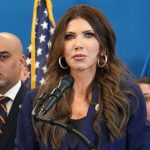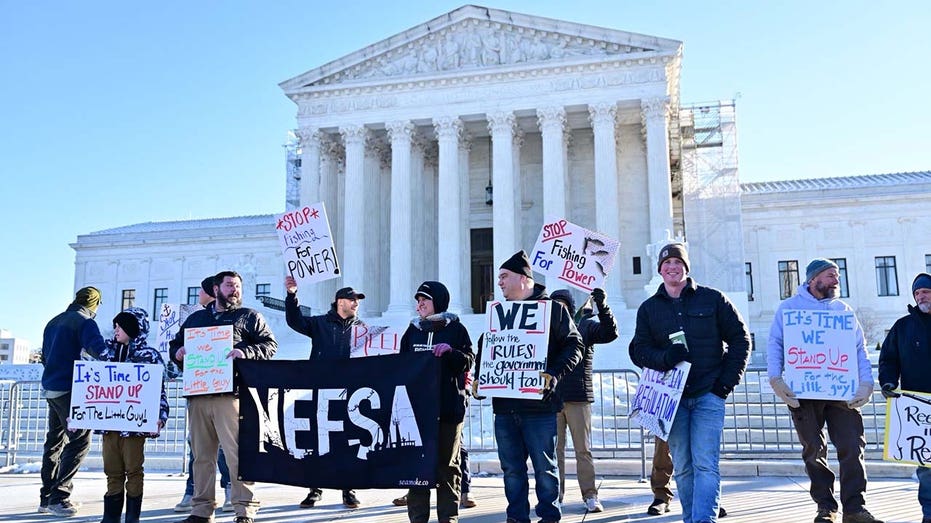The Supreme Court on Friday ruled in favor of a group of fishermen who challenged a decades-old legal doctrine that they say gave the administrative state too much power over their business.
In a 6-2 ruling where Justice Ketanji Brown Jackson did not participate, the court’s majority said the federal rule promulgated by the National Oceanic and Atmospheric Administration (NOAA) requiring the fishermen to pay $700 a day for an “at-sea monitor” is out of the bounds Congress set for the federal agency.
The justices in January heard the arguments of two cases stemming from lawsuits brought by New Jersey fishermen and herring fishermen from Rhode Island challenging NOAA’s rule they say threatened to ruin their livelihoods.
The court’s decision overruled what’s known as the Chevron doctrine — a legal theory established in the 1980s that says if a federal regulation is challenged, the courts should defer to the agency’s interpretation of whether Congress granted them authority to issue the rule, as long as the agency’s interpretation is reasonable and Congress did not address the question directly.
“Chevron is overruled,” Chief Justice John Roberts wrote for the court’s majority.
“Courts must exercise their independent judgment in deciding whether an agency has acted within its statutory authority, as the APA requires. Careful attention to the judgment of the Executive Branch may help inform that inquiry. And when a particular statute delegates authority to an agency consistent with constitutional limits, courts must respect the delegation, while ensuring that the agency acts within it,” he wrote.
“But courts need not and under the APA may not defer to an agency interpretation of the law simply because a statute is ambiguous,” he said.
READ THE SUPREME COURT DECISION – APP USERS, CLICK HERE:
He added that Chevron “was a judicial invention that required judges to disregard their statutory duties.”
“And the only way to ‘ensure that the law will not merely change erratically, but will develop in a principled and intelligible fashion,”he said.
Justice Clarence Thomas in a separate concurrence wrote that Chevron deference “permits the Executive Branch to exercise powers not given to it.”
“Chevron deference was ‘not a harmless transfer of power,'” Thomas wrote said.
“‘The Constitution carefully imposes structural constraints on all three branches, and the exercise of power free of those accompanying restraints subverts the design of the Constitution’s ratifiers.’ In particular, the Founders envisioned that ‘the courts [would] check the Executive by applying the correct interpretation of the law.,'” he continued.
“Chevron was thus a fundamental disruption of our separation of powers. It improperly strips courts of judicial power by simultaneously increasing the power of executive agencies. By overruling Chevron, we restore this aspect of our separation of powers,” he said.
Justice Neil Gorsuch also penned a separate concurrence saying, “Today, the Court places a tombstone on Chevron no one can miss. In doing so, the Court returns judges to interpretive rules that have guided federal courts since the Nation’s founding.”
The set of cases was seen as a David versus Goliath matchup between East Coast fishermen and the power of the federal government.
The fishermen argued that the mandated cost of at-sea monitors cuts into 20% of their business.
Jerry Leeman, CEO of the New England Fishermen’s Stewardship Association (NEFSA) praised the Friday decision saying, “Federal officials usually ignore the well-grounded concerns American fishermen share about overregulation.”
“We are grateful to the Supreme Court for bucking this trend. And we are especially grateful to the fishermen-plaintiffs in Relentless and Loper Bright who have spent years fighting for their brother and sister fishermen everywhere.”
Former U.S. Solicitor General Paul Clement, who argued on behalf of the fishermen, said the court’s decision “puts to rest an interpretive methodology that has seriously distorted how the political branches operate for far too long. Courts should ask what the law means, not whether it is ambiguous, and in close cases, the tie should go to the citizen, not the government.”
HOW MAINE LOBSTERMEN TURNED A ‘SLAP IN THE FACE’ FROM THE WHITE HOUSE INTO A POLICY VICTORY
“We are gratified that the Court restored the constitutionally mandated separation of powers,” he said.
Justice Elena Kagan, joined by Justices Sonia Sotomayor and Ketanji Brown Jackson, dissented from the majority, saying that the Chevron rule ” has formed the backdrop against which Congress, courts, and agencies—as well as regulated parties and the public—all have operated for decades. It has been applied in thousands of judicial decisions.”
“It has become part of the warp and woof of modern government, supporting regulatory efforts of all kinds—to name a few, keeping air and water clean, food and drugs safe, and financial markets honest,” Kagan said.
“Judges are not experts in the field, and are not part of either political branch of the Government,” Kagan wrote, citing the Chevron case decided some 40 years ago.
“Those were the days, when we knew what we are not. When we knew that as between courts and agencies, Congress would usually think agencies the better choice to resolve the ambiguities and fill the gaps in regulatory statutes,” she said.
“Because agencies are ‘experts in the field.’ And because they are part of a political branch, with a claim to making interstitial policy. And because Congress has charged them, not us, with administering the statutes containing the open questions,” she continued.
“At its core, Chevron is about respecting that allocation of responsibility—the conferral of primary authority over regulatory matters to agencies, not courts,” she said.
























